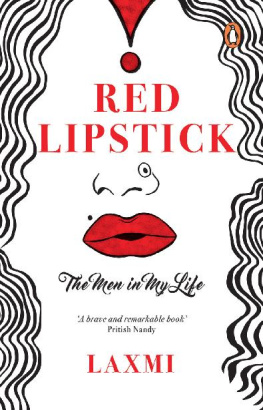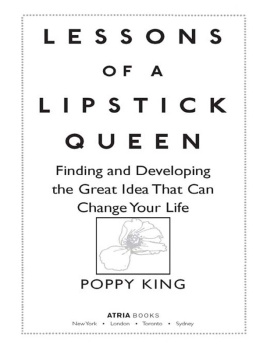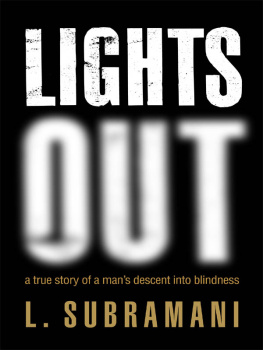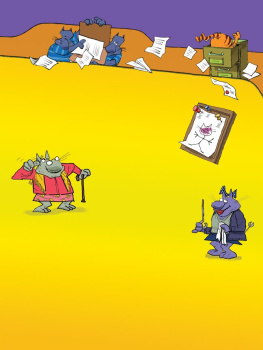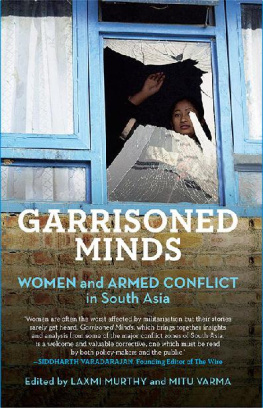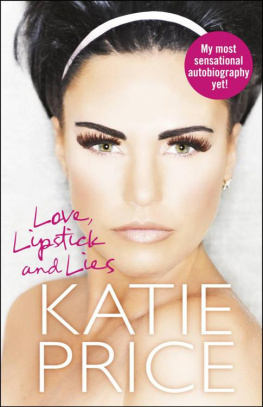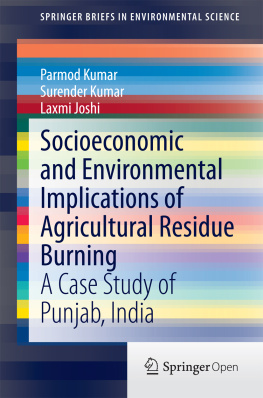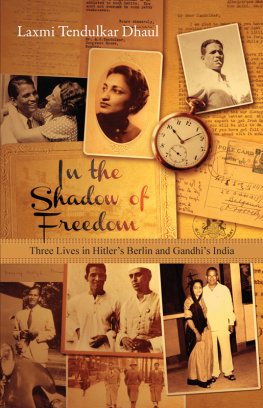LAXMI
POOJA PANDE
RED LIPSTICK
The Men in My Life
Contents
PENGUIN BOOKS
RED LIPSTICK
Laxmi, transgender rights activist, Hindi film actor and Bharatanatyam dancer, is a celebrity and an LGBT icon. Founder of the NGO Astitva, which works towards the support and development of sexual minorities, she is the first transgender who went to the United Nations representing the Asia Pacific sex workers. Laxmi played a pivotal role in the recognition of hijras as the third gender in India.
Pooja Pande is a writer and editor with a keen interest in gender issues.
PRAISE FOR THE BOOK
An unapologetic tell-all Asian Age
Laxmi... for all her terrifying Kali-like persona, one can only feel admiration... there is an unexpected touch of... bravado New Indian Express Red
Vishnu is Mohini and Mohini, Vishnu.
This book is dedicated to our gods and goddesses...
Because they get it.
The Red Lipstick Monologue
When I was born, the doctor checked my genitals and pronounced me a boy.
Who could foretell that a claim like that, a seemingly innocuous gesture, would mark me for life?
What were assigned as at birthmale or femaleis our gender. And somewhere along the way, we human beings decided that that gender would dictate our lives, steer us down certain paths, brand our behaviour, and inform almost all our choicesfrom something as trivial as the colour of your car to bigger decisions such as choosing a partner for life. Nobody ever seemed to realize that gender is nothing but an unromantic box.
And so it is that people like me, who fall nowhere in this binary, or somewhere in between, or even leap beyondto me, the term transgender has always implied transcending genderare considered misfits in society. We are termed abnormal, but as LGBT rights activist Ashok Row Kavi told me all those years ago when I, a boy myself, asked him why I liked mens crotches: The world around us is abnormal, baby. You are normal.
As I was growing up, in the eyes of the world and those of my own family, I never gravitated towards manly things. I loved to draw and paint, twirl around in lovely, flowy fabric, wear make-up and jewellery. My absolute passion, however, was dance. In dancing I was completely and utterly free. All of this meant, of course, that I was feminine. But the problem was that I was feminine despite being a boy. So when I wore bangles because they looked so good, red and shiny on my wrists, I would be told off by my friends mother. Everyones reactions around me seemed to indicate that I was acting like a girl, so I felt like a girl too. I would often refer to myself as one Main abhi aati hoon , I would say, and immediately be reprimanded for doing that. Ladkiyon jaisi harkat mat kar (Dont act like girls), I would be told. When I decided to grow my hair because long hair is beautiful, it really disturbed my father. He made sure I had it cut, because Achche ghar ke ladke aise nahi karte (Boys from good households do not behave this way).
The world kept suggesting I was a girl, but my private parts indicated that I was a boy. And then there was the whole question of sexuality. I was attracted to boysmy first inklings and stirrings of lust came from noticing big, strong arms, the hint of a guys moustache over his lips, billboards that advertised mens underwearand I was puzzled. Was there a woman inside me who couldnt really express herself because of some last-minute mix-up that god did at the time of my birth?
Back then, in the early 1990s, the word gay simply meant happy. Until one fine day, I was told that, in fact, that was who I was. Directed to Ashok for advice, I remember that day in Maheshwari Gardens so very well when seeing him and others like him and me around, I was overjoyed to have finally found an identity I could call mine wholeheartedly. I was not chhakka , mamu , god , or any of those terms hurled at me on a daily basis as abuses. I was gay. The world might still not like me for desiring someone of my own sex, but at least now there was certainty. For the first time in my life, I could set aside the crippling confusion and say to the world: I am a gay man.
The certainty did not last long. Now the world expected me to behave in yet another wayonce again I was confronted with parameters and boundaries. I could wear shirts and pants, but I had to look and act pansy. And if I felt like wearing lipstick and a sari, it would mean I was doing drag. I just liked the feel of the sari, and the way it draped over my body. Does there really have to be more to it, I wondered. As a gay man, I was also always supposed to be cruising other gay mento be on the lookout for sex almost constantly. How exhausting! Is that any way to live? And why is it all only about sex?
I wondered about all this as I went on with my life, checking the boxes I was tagged under as a gay man, as a drag queen. But the question of my identity, that dialogue with myself, remained unanswered, unaddressed. Who am I when its just me, alone in my room? Who am I for the world? Are these two selves different, do they have to be?
I am thirty-seven today and, over the years, I dont know if I have reached a place closer to the answer; I dont know if I ever will. But if there is one identity I stay true to, it is the one that was created almost seamlesslyit is the Laxmi the world demanded when I went out to make my voice heard, to talk about the rights of transgenders. The persona of Laxmi the activist that was formed as much by the world I was interacting with, as by my own efforts. The supremely confident Laxmi who wears gorgeous saris, expensive make-up and perfume, who projects an image of absolute self-assurance, travels the length and breadth of the country and attends international conferences, gives speeches at queer pride parades, delivers TED Talks, is interviewed by the likes of Guernica and Salman Rushdie. So many doors that were closed to me, that were firmly shut, opened to this Laxmi. The creation of this persona has played an incredibly important role in my story, in the journey of my lifeI began to enjoy being this Laxmi. And this Laxmi got things done. So she is as much for the world as for me.
If there is one role for me, the one big cause I know I am meant for, the raison dtre of my existence, it is that of an activist. I firmly believe that even if you have the best laws, unless you change the mindset of people, nothing will change. And that is what true activism means to me. Thats why I can never be a 95 activist, I dont understand that, I am and can only be a 24/7 activist. Which is why, whatever the circumstances in my personal life, in public I have to be that the Laxmi. Once I step out of my personal space, I cannot be merely myself. I have to be in the garb of that strong activist Laxmi because, inadvertently, I have come to represent a community of millions of people in this country. People look up to me and I have to fulfil the responsibilities of the role that has been given to me. No matter what Im dealing with in my personal life, in public, I always go as Laxmi, the strong unbreakable activist nobody can mess with. In fact if I am going through a difficult time personally, I act even stronger when I don the persona. When Im completely alone, all by myself, Im not sure what feeling I am most comfortable with, who I feel is completely and only me. I ask myself many questions: Who am I? What am I? Then later I think, Fuck it. I am Laxmi. Thats my persona; there is no room for doubt.




